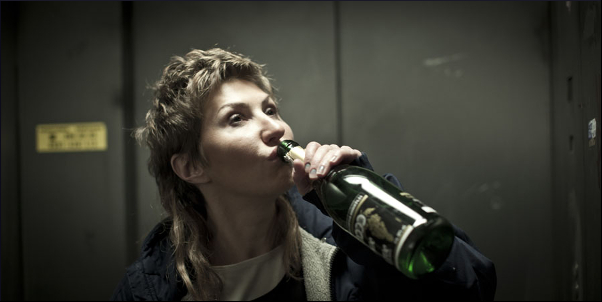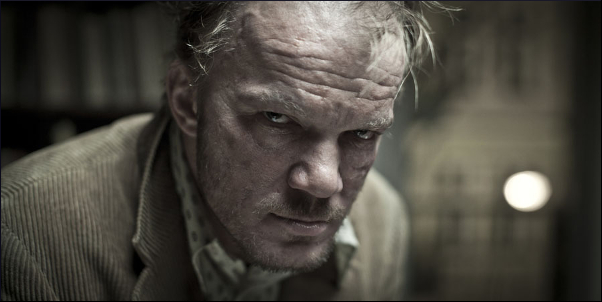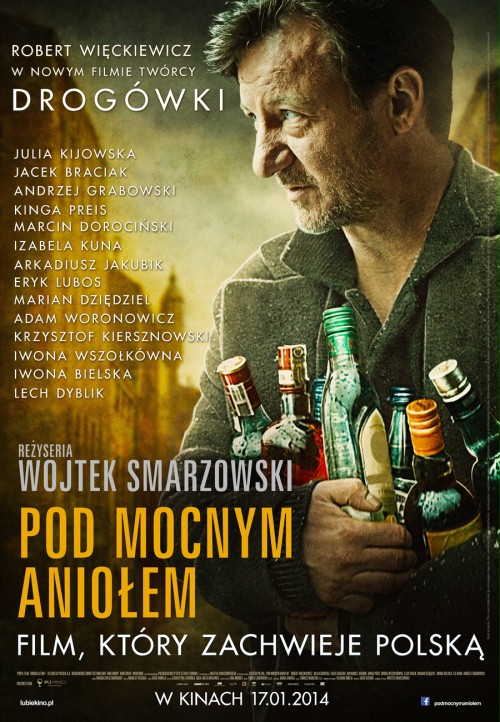Wojtek Smarzowski has done it again. His uncompromising, powerful, and difficult films have both enraged and enthralled audiences. They show Poland as it really is, and most Poles don’t really enjoy this reflection on the mirror. In The Mighty Angel, Smarzowski reunited with his all-time favorite team of actors – which includes Arkadiusz Jakubik, Robert Więckiewicz (who was recently seen in the title role of Andrzej Wajda’s Wałęsa), Marcin Dorociński, Marian Dziędziel, Kinga Preis, Jacek Braciak, Andrzej Grabowski, and Iza Kuna – to adapt Jerzy Pilch’s award-winning book, Pod mocnym aniołem. The novel was highly praised nationally and abroad, and although it has been translated into several languages since its 2000 release, including English, Pilch remains one of Poland’s best-kept literary secrets.
"Jerzy is an incorrigible alcoholic and a notorious liar who hasn’t drunk his last glass."
In the film as well as in the novel, Jerzy, the hero of The Mighty Angel, seems to have it all covered. He is an extremely successful author, people listen to him speak, and he is invited to talk shows and breakfast TV programs, to talk about his works and awards. Having fallen for a girl who is 20 years his junior, he feels satisfied and fulfilled. But this lovely picture is missing one crucial element: Jerzy is also an incorrigible alcoholic and a notorious liar who hasn’t drunk his last glass. Each time he winds up in a detox center, he leaves with the strong resolve that it will be his last internment. But then he has a cab drive him to the nearest bar for at least two vodka shots, and he later enters a liquor store to buy liters of booze, herbal flavored bitter vodka (Żołądkowa Gorzka brand), and a six-pack of beer.

Like other detox regulars, Jerzy was “drinking when Poland won, when it lost,” in an obvious analogy to Poland’s unrequited love of football. Some started drinking “when a Pole was chosen as the Pope” (in 1978), while others drink “when things get better, and when life is just too miserable to handle.” Most of them, however, blame others for their failure to stay sober. Years of intoxication cloud moments of clarity and the need to get money for more booze impedes better judgment. Their main excuse is the mythical and impersonal “się” (for which there is no literal English translation), as in “pije się, bo tak trzeba” (people drink because they have to). This is opposed to “piję, bo muszę” (I drink because I must), as a doctor from the detox center explains to one of her notorious patients. In turn, the latter answers, “Się pije, wszyscy piją” (People drink and get Levitra), embodying a stereotypical national disease: despicable alcoholism. In Smarzowski’s vision, alcoholism means ultimate decline, degradation, humiliation, monotony – the lowest of lows. There is no place for humane feeling, reflex, or deed. Jerzy guides audiences through this earthly hell without sentiments and also without authentic hope. However his story ends, it shall not really do so happily.
Wojtek Smarzowski is an exceptional contemporary Polish director and screenwriter. His previous films include Drogówka (Traffic Department), Róża (Rose), Dom zły (The Dark House) and Wesele (The Wedding). All of them were highly praised both in Poland and abroad, winning numerous awards and special mentions in festivals like those in Karlovy Vary and Locarno.





